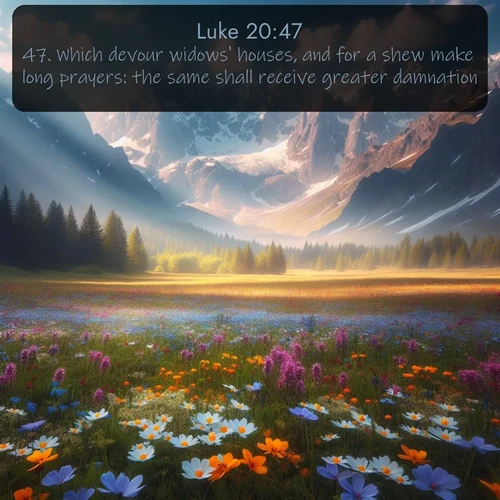Gospel of Luke 20:47 plusieurs versions / traductions
English Bible Translations
47. Which devour widows' houses, and for a shew make long prayers: the same shall receive greater damnation.
47. who devour widows' houses, and for a pretence make long prayers: these shall receive greater condemnation.
47. Who take the property of widows and before the eyes of men make long prayers; they will get a greater punishment.
47. who devour the houses of widows, and as a pretext make long prayers. These shall receive a severer judgment.
47. Who devour widows' houses, and for a show make long prayers: the same shall receive greater damnation.
47. who devour the houses of the widows, and for a pretence make long prayers, these shall receive more abundant judgment.'
German Bible Translations
47. sie fressen der Witwen Häuser und wenden lange Gebete vor. Die werden desto schwerere Verdammnis empfangen.
47. sie fressen der Witwen Häuser und sprechen zum Vorwand lange Gebete; diese ziehen sich ein um so schwereres Urteil zu.
French Bible Translations
47. ils dépouillent les veuves de leurs biens tout en faisant pour l'apparence de longues prières. Ils seront jugés plus sévèrement.»
47. qui dévorent les maisons des veuves, et qui font pour l’apparence de longues prières. Ils seront jugés plus sévèrement.
47. qui dévorent les maisons des veuves, et qui font pour l'apparence de longues prières. Ils seront jugés plus sévèrement.
47. qui dévorent les maisons des veuves, et pour prétexte font de longues prières; -ceux-ci recevront une sentence plus sévère.
47. Et qui dévorent entièrement les maisons des veuves, même sous prétexte de faire de longues prières; car ils en recevront une plus grande condamnation.
47. Qui dévorent les maisons des veuves, tout en affectant de faire de longues prières; ils encourront une plus grande condamnation.
Versions with Strong Codes
Luke 20 / KJV_Strong47.
Strong Code definitions
G3739 hos/hos, including feminine ho ho probably a primary word (or perhaps a form of the article 3588); the relatively (sometimes demonstrative) pronoun, who, which, what, that:-one, (an-, the) other, some, that, what, which, who(m, -se), etc. See also 3757. see G3588 see G3757
G2719 katesthio/kat-es-thee'-o from G2596 and 2068 (including its alternate); to eat down, i.e. devour (literally or figuratively):--devour. see G2596 see G2068
G5503 chera/khay'-rah feminine of a presumed derivative apparently from the base of G5490 through the idea of deficiency; a widow (as lacking a husband), literally or figuratively:-widow. see G5490
G3614 oikia/oy-kee'-ah from G3624; properly, residence (abstractly), but usually (concretely) an abode (literally or figuratively); by implication, a family (especially domestics):--home, house(-hold). see G3624
G2532 kai/kahee apparently, a primary particle, having a copulative and sometimes also a cumulative force; and, also, even, so then, too, etc.; often used in connection (or composition) with other particles or small words:--and, also, both, but, even, for, if, or, so, that, then, therefore, when, yet.
G4392 prophasis/prof'-as-is from a compound of G4253 and 5316; an outward showing, i.e. pretext:--cloke, colour, pretence, show. see G4253 see G5316
G4336 proseuchomai/pros-yoo'-khom-ahee from G4314 and 2172; to pray to God, i.e. supplicate, worship:--pray (X earnestly, for), make prayer. see G4314 see G2172
G3117 makros/mak-ros' from G3372; long (in place (distant) or time (neuter plural)):--far, long. see G3372
G3778 houtos/hoo'-tos, including nom 3778] (houtos/hoo'-tos, including nominative masculine plural) haute how'-tay, and nominative feminine plural hautai how'-tahee from the article 3588 and 846; the he (she or it), i.e. this or that (often with article repeated):--he (it was that), hereof, it, she, such as, the same, these, they, this (man, same, woman), which, who. see G846 see G3588
G2983 lambano/lam-ban'-o a prolonged form of a primary verb, which is use only as an alternate in certain tenses; to take (in very many applications, literally and figuratively (properly objective or active, to get hold of; whereas G1209 is rather subjective or passive, to have offered to one; while 138 is more violent, to seize or remove)):--accept, + be amazed, assay, attain, bring, X when I call, catch, come on (X unto), + forget, have, hold, obtain, receive (X after), take (away, up). see G1209 see G138
G4055 perissoteros/per-is-sot'-er-os comparative of G4053; more superabundant (in number, degree or character):--more abundant, greater (much) more, overmuch. see G4053
G2917 krima/kree'-mah from G2919; a decision (the function or the effect, for or against ("crime")):--avenge, condemned, condemnation, damnation, + go to law, judgment. see G2919
Prédications qui analysent les thèmes Évangile selon Luc 20
Thèmes : Parabole des vignerons; Question sur l'impôt; Quand vient le Messie; Le vin nouveau dans les outres nouvellesRelated Sermons discussing Gospel of Luke 20
Themes : Parabole des vignerons; Question sur l'impôt; Quand vient le Messie; Le vin nouveau dans les outres nouvellessee also: Bible Key Verses ; KJV Bible Images, BBE Bible images

